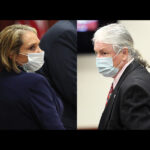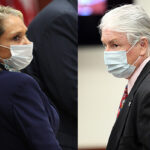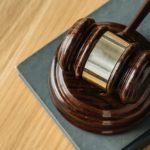INDIAN RIVER COUNTY — Admissibility of testimony of the Florida Bar’s chief auditor and the facts of Ira Hatch’s disbarment are two main disputes expected to be settled today in the trial.
Hatch is the former owner of Coastal Escrow Services and is accused of 46 felony counts including grand theft, racketeering and money laundering.
Much of Thursday morning was consumed with the minutiae of the general ledger of Hatch’s law firm trust account and the cross-examination of former bookkeeper Mary Kincaid about office procedures. The afternoon began in a similar manner but soon escalated into a standoff between defense attorney Gregory Eisenmenger, assisted by his client, and Assistant State Attorneys Lev Evans and Ryan Butler. A tape-recorded court record and case law presented by attorneys should give Senior Judge James Midelis the information he needs to rule on both matters when court resumes at 8:45 a.m.
The controversy centers around the noticing of expert witness names and whether or not the jury should be allowed to hear testimony about Hatch consenting to a voluntary disbarment amid mounting charges of improprieties by the Florida Bar in the fall of 2007.
Eisenmenger claimed that during a December status hearing on the case, the state gave a short list of expert witnesses and said those would be the only experts called to testify. Butler countered that the response was only about accounting experts scheduled to testify about the bank records of Coastal Escrow Services and the experts brought forth Thursday to testify about the trust account and the disbarment were not relevant to the December hearing.
Originally, Eisenmenger had said the statement was made at a May 2009 hearing, but when that was shown not to be the case, he said he thought it was the December hearing.
“He’s just going from hearing to hearing hoping he’ll find something,” prosecutor Butler told Judge Midelis during heated debates on the issue.
Midelis ordered clerks to burn a CD of the 33-minute meeting so all parties can hear exactly what was said, stating he did not want to give Eisenmenger the issue to use to possibly overturn him on appeal.
When the jury was sent out of the courtroom so attorneys could speak with Judge Midelis about legal matters, Vero Beach trial lawyer Louis B. “Buck” Vocelle Jr. had already laid the groundwork for prosecutors to question officials from the Florida Bar. Vocelle testified to making the initial phone call to the Florida Bar on Aug. 31, 2007, which set off an investigation into Hatch’s trust handling of the Hatch & Doty P.A. trust account.
Vocelle said Hatch’s former law partner, Kevin Doty brought him in as co-counsel on a personal injury case and that insurance companies had paid the plaintiffs $152,500, which was deposited in the Hatch & Doty trust fund, to be dispersed for expenses, medical bills, legal fees and ultimately the balance to the injured parties.
“What did you do with the money?” Evans asked Vocelle.
“Never got the money,” Vocelle responded.
When Vocelle found out that the money owed his clients had gone missing from the trust account, he said he and Doty decided to report the matter to the Florida Bar.
“I called the Florida Bar and I told them I had learned that there was no money in the account,” Vocelle said.
Midelis later told jurors to disregard that statement as hearsay.
On the grounds that Vocelle’s testimony might be tainted by bias, Eisenmenger brought out in his cross-examination of Vocelle that he was representing Doty in a civil suit against Ira and Marjorie Hatch and that he had filed motions to keep Doty’s computers from being seized for the criminal trial.
Vocelle also represented Robert Lowe, one of the alleged victims who as personal representative for an estate, was responsible for $1.14 million of entrusted to Hatch and lost when Coastal Escrow closed on Sept. 4, 2007.
Following up on testimony about the phone call to the Florida Bar, prosecutors called investigator David Callan to the stand.
Callan was the Florida Bar investigator who met with bookkeeper Kincaid in Young Park on Aug. 31 to get Hatch & Doty financial records. He also served the search warrant on Hatch and on Seacoast Bank and accompanied attorney Kevin Doty to the bank to freeze accounts testified to his involvement in the case.
But when the prosecution tried to put top Florida Bar officials Clark Pearson and Sheila Tuma on the stand as experts, testimony halted for the afternoon.
Whether or not Hatch gave up his license to practice law is admissible in this criminal trial is to be hashed out with both sides presenting case law supporting their positions.
When the court recessed Thursday, one witness from the Florida Bar was assisting the state in obtaining cases that support the admissibility of the disbarment and attorneys were heading upstairs to dig into law books looking for other precedent.
In September 2007, Hatch signed a consent form saying that he was voluntarily giving up his license to practice law in Florida and that he was not contesting a list of charges against him, which Florida Bar officials said was contained in the consent form.
Eisenmenger argued that the consent form does not constitute an admission of anything. Midelis on Thursday agreed, but asked to see case law from both sides.






